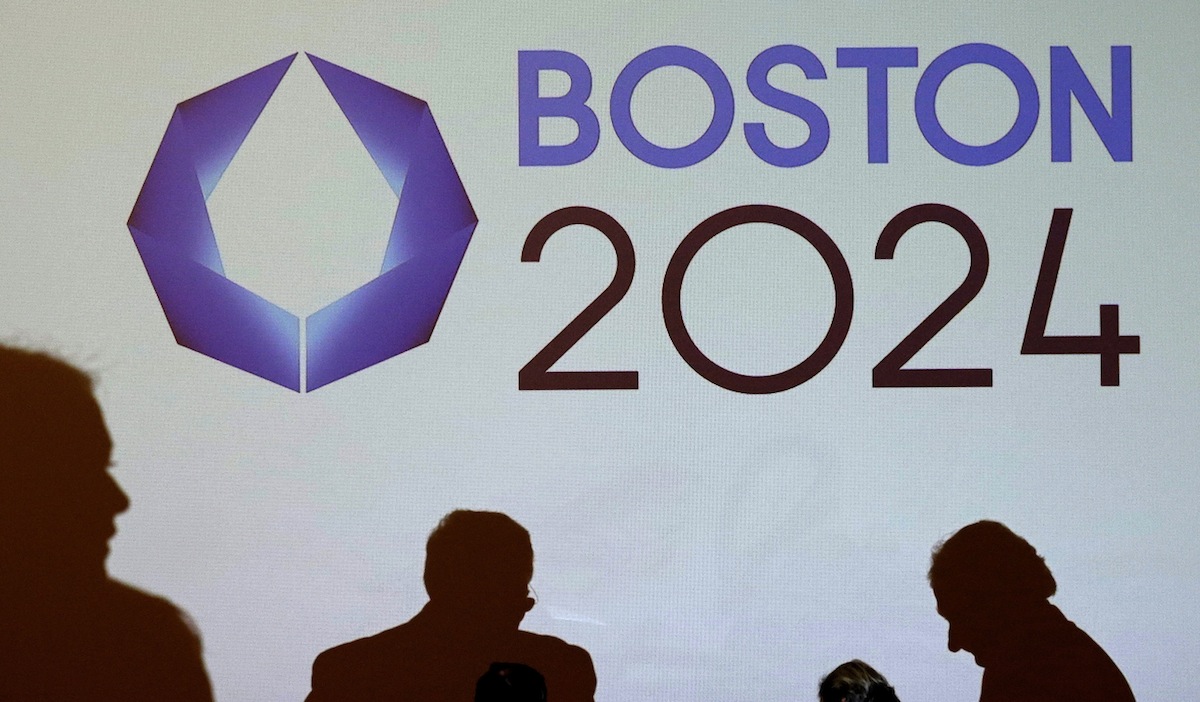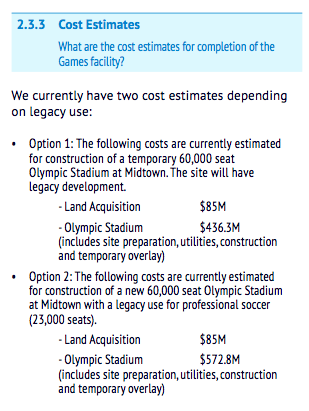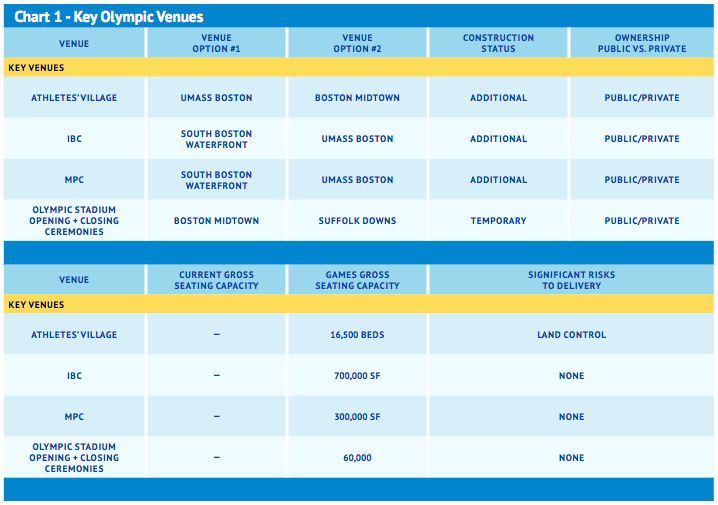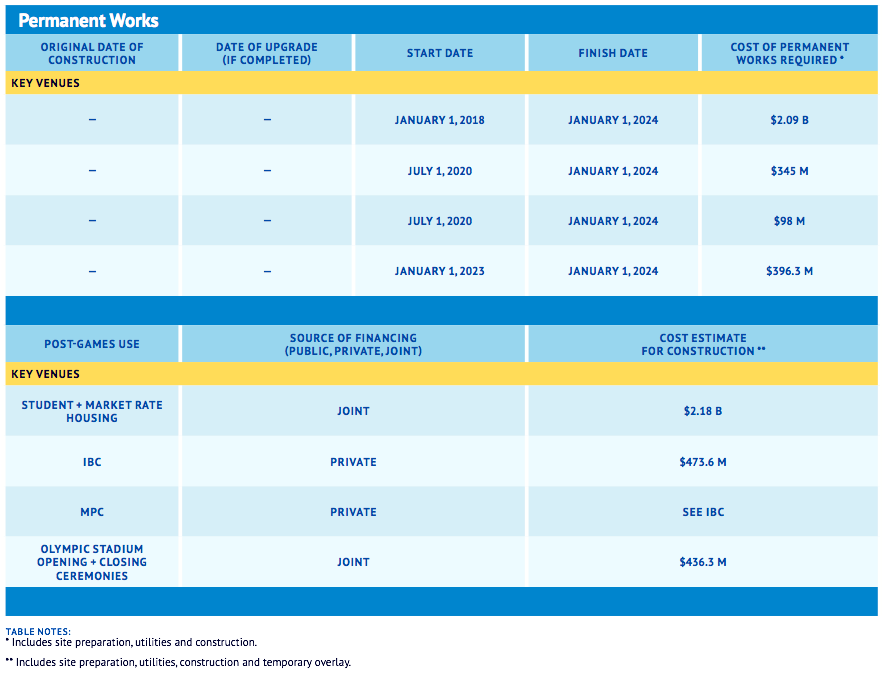Here’s the Bid Book Boston 2024 Submitted to the USOC

Photo via AP
Update: Wednesday, 2:33 p.m.
Boston 2024 Vice President Erin Murphy provided the following statement via email: “As stated previously, there is a limited amount of proprietary information that the USOC has asked Boston 2024 not to release because they believe it will put Boston and the United States at a competitive disadvantage.”
Previously:
Boston Magazine has obtained the final draft of Boston 2024’s “highly confidential” bid book, submitted to the United States Olympic Committee in December. The bid book, obtained via public-records request filed with the University of Massachusetts, reveals details of the bid previously omitted from materials provided by Boston 2024 to the public.
Though the bid claims the PDF files available for download on its website are “a copy of the Boston 2024 documents presented to the USOC,” conspicuously missing are numerous cost estimates, as well as an entire section outlining the bid’s weaknesses. The version presented to the USOC, for example, includes a cost estimate for 60,000-seat “Midtown” stadium proposed for Widett Circle, omitted from the public version:

Many cost estimates were similarly scrubbed from the public version, including: land costs (“The cost to acquire the land is estimated at $269 million. This cost also includes relocation costs for state (MBTA) and city facilities, other infrastructure costs plus a $25 million contingency.”); construction costs ($2.18 billion); legacy costs ($89.7 million); costs for the International Broadcast Center (IBC)/Main Press Center (MPC), including site preparation, utilities, construction, and temporary overlay ($473.6 million); as well as this chart:


The bid book’s “Sports and Venues” chapter features a comprehensive chart listing each sport and its proposed venue. Omitted from the public version and contained in the USOC version is a column listing cost estimates for the construction of each venue. Another section missing from the public version, titled “Financing: Who will finance the design/construction?”, appears to contradict Boston 2024 CEO Rich Davey’s assertion that taxpayer money would only be used for security:
Initially, a public authority (e.g., City of Boston affiliated Industrial Development Authority) will fund land acquisition and infrastructure costs while the OCOG budget will assume the costs associated with the construction and restoration of the temporary stadium structure, Olympics back-of-house and warm-up areas. A private sector development group will be selected for the proposed development of the project that will provide funds to pay for the debt service on the initial financing utilized for land acquisition and infrastructure costs.
And another, titled “Shared Financing: If financing of the stadium is shared, what is the percentage for each partner?”:
We have determined that the OCOG budget will finance approximately 33% ($173M) of cost of the stadium. These funds will be used for construction of the temporary stadium structure, Olympics back- of-house, warm-up areas, rent and restoration of the area post-Games. The additional $345M (67%) needed for land acquisition and infrastructure upgrades will use tax increment financing bonds secured by new tax revenues generated from the mixed use developments as well as land lease payment from private developers, including payments for a ~2,000 space commuter parking structure to be developed in conjunction with the Massachusetts Convention Center Authority.
In the bid book’s “Overall Games Concept” chapter, a section titled “SWOT Analysis”—rebranded as the “International Communications Narrative” in the public version—asks bid organizers to provide a “realistic assessment of the strengths, weaknesses, opportunities and threats your city could leverage or have to confront during the international bid process.” The following “Weaknesses and Threats” section is missing from the public version:
While the positive opportunities catalyzed by hosting the 2024 Olympic and Paralympic Games far outweigh the challenges, Boston would put plans in place to deal with the realities of hosting the Games, including:
- Land Acquisition and Control: Early indications show that public and academic entities (which control the majority of the land Boston would need to host the Games) are willing and able to cooperate. However, we want to manage these relationships and processes very carefully so as not to run into any complications related to venue siting and transportation planning. We are working in close concert with city, state and quasi-public entities to ensure a smooth and predictable process.
- Community Concerns: Since we are at the very beginning stages of socializing the idea of hosting the 2024 Games among our local community, there are many questions and concerns about any negative impact on the local community. To ease concerns about making this a Games hosted by the whole city, not just parts of it, we are committed to a transparent and open conversation with community groups and have dedicated resources to fostering a dialogue that is fact-based and takes into consideration the needs of the community.
- Optics of the Cost of the Games: Given recent media reports about large scale sporting events and the financial impacts on their host communities, people in Massachusetts and Boston are in need of a realistic education about the costs of the 2024 Olympic and Paralympic Games. As part of our public relations strategy, we will work from a realistic budget number to manage expectations, clearly divide the costs between public and private expenditures and actively communicate the benefits of bidding for and hosting the Games.
In a section omitted from the version provided to the public, Boston 2024 organizers expressed its commitment to transparency and desire to “realistic education about the costs of the 2024 Olympic and Paralympic Games,” which were also left out.
You can download and view the final draft of the Boston 2024 bid book below:


